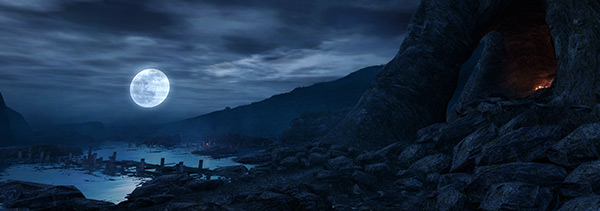Englishness
On Everybody's Gone To The Rapture
Warning: in this piece I'm primarily talking about Everybody's Gone To The Rapture, which isn't out on PC as yet, though I'll willingly devour at least one item of clothing if it doesn't walk this way eventually. Anyway, I talk about STALKER and Dear Esther too, so everything's OK.
Playing The Chinese Room's new game, Everybody's Gone To The Rapture, what strikes me almost immediately is not the mystery, the science fiction trappings or even the extreme prettiness. It's that I'm in England. A very particular England.
Many have made apt comparisons to The Archers, but for me it evokes camping trips. It's the small villages you wander through when you leave the campsite, those pristine, proud little communities you ramble through and to, almost everyone in them dedicated to order and attractiveness in a way that's profoundly uncommon in cities, where clamour and business effectively forbid it. In these middle-England villages, it's all community noticeboards and floral front gardens, cars left unlocked and he said, she said tutting.
These villages are people's homes, their lives, their drama, their pride and their outrage. For me and my camping companion, they're simply attractive structures to support a charming pub at which we may consume a crusty bread-based lunch and sample a local ale with a name that was probably hilarious to old men in the 80s, like Knee-Trembler, or Betty Flourbags. We will think we are in paradise, but suggest that we spent years of our lives in a place like this and our comfort will turn to terror. The conservatism. The Conservatism. The clear expectation to be the same forever.
They represent a partial fabrication of Englishess, the one certain newspapers claim is perpetually under threat by migrants, but which has only ever existed in these between-places and their tiny headcounts, is not and cannot be true of the cities and towns which hold the bulk of this nation's population. What seemed blissful suddenly seems stifling. The only reason I wanted to run in Everbody's Gone To The Rapture was when the fear that I might end up trapped in a place like that overwhelmed my admiration for how painstakingly it had recreated one.
I'm amazed that a PlayStation 4-exclusive game would be emulating this. I'm amazed - the tax breaks it gains the developers aside - that it would go so full-on in creating a very English fantasy, which can only mean as much as it does to a tiny fraction of the world. I see that hanging pub sign, that warped stile, the hogweed by the roadside or I hear the clipped, fussy tone that denotes a busybody and I know them intimately. All of these things and more immediately mean to something to me. Surely, for an American (for but one example) it'll be like visiting another planet. Which, I suppose, will be part of the appeal.
And perhaps that's why I appreciate STALKER so much. The distinctly Russian and/or European design of its buildings, a very particular starkness even if the science fiction weren't there, the stoic determination, an overwhelming sense of silent strife: it is another world, and I am fascinated by its otherness. For a native, is it like me and those camping daytrip sights in Everybody's Gone To The Rapture? Are its underpinnings disconcertingly familiar? Is it eerie because it is ordinary?
Rapture is a natural follow-up to the developer's earlier Dear Esther, not because it ratchets up the graphical technology or the complexity of its narrative and interactions, but because it's exploring another facet of British existence. Esther was the forlorn seaside walk, the existential crisis on the lonely clifftop, the ramble in damp weather, the soggy sandwiches eaten among the heather bushes. The coastal holiday that's supposed to relax you but leaves you introspective and anxious, that reminds you how much you need people but makes you feel more you because you're away from them.
If there's any justice in the world, the Chinese Room's next game will be set in a musty one-bed flat in a terraced house, in which you try to drown out the sound of the couple next door alternately arguing and screwing by watching Bergerac repeats at high volumes, and sometimes you watch people take their dogs to shit in the patch of ownerless scrubland outside your back window. But they'll probably go further into the sci-fi thing instead, I guess. Or try this grand-scale recreation again, with some part of America. That would be fascinating.
I'm rambling, I know. Both Esther and Rapture to that to me, leave my mind gently spiralling, chewing over dim feelings of loss and regret, hankering for solitude and fearing its effects. STALKER does too, but it does it somewhere entirely alien. I'd like to experience that with and from other cultures. Are there wealthy, protective villages in the middle of Germany? What is it like to stroll along a cliff path in the exterior of Egypt? Who lives on the islands just off Spain? Technology has reached the point where it can meaningfully evoke these places and these experiences, where the land rather than the people is what tells the tale. I hope Englishness is not the only culture to enjoy the resources necessary to recreate itself on a screen. And I hope Everybody's Gone To The Rapture comes to PC soon so I can write more about it, and how it makes me feel.
This feature was originally published last week as part of, and thanks to The RPS Supporter Program.



